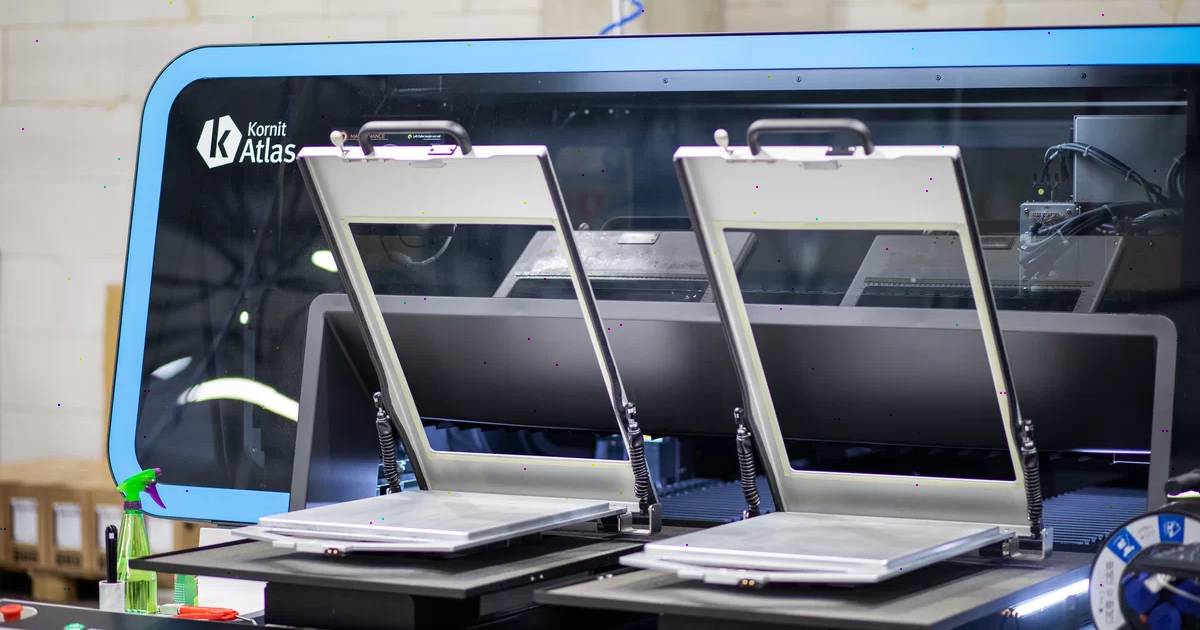Print-on-Demand Production Consolidates Amid Increased Investment

By Mark Seavy
Once a niche business, print-on-demand (POD) suppliers are rapidly consolidating as supply seeks to keep pace with increasing demand.
For example, Delta Apparel’s DTG2Go—a major POD supplier for Redbubble, Fanatics, and others—shut down last year. Before that, Apollo Global Management backed Shutterfly’s acquisition of home products POD manufacturer Spoonflower (custom fabric, wallpaper) and Platinum Equity’s Mad Engine previously acquired a controlling stake in Fifth Sun and its POD facility in Hebron, KY. Additionally, Hybrid Apparel entered POD in buying Airwaves in 2021.
These acquisitions and consolidations were capped by Printify and Printful’s proposed merger late last year. The proposed agreement would result in a company with $600 million in combined annual revenue and a network of POD facilities. While Printful has internal POD facilities, Printify has a network of 85 third-party suppliers producing t-shirts, hoodies, sweatshirts, stickers, and other products for a customer list that includes brands like Adidas, Columbia, Champion, and others.
The global POD business generated $7.6 billion in revenue in 2023 and is forecast to increase 25.8% annually through 2030 to reach $36.2 billion, according to Grandview Research.
“I am seeing companies spin off as sales or marketing companies and using another company that has significant scale for print on demand,” said Trevor George, CEO of POD supplier Trevco. “More fulfillment is going to print on demand because I don’t think the consumer really knows that something is print on demand. Pre-Covid, it was a different story in that companies would order inventory and hold it all the time, but people are less willing to do that now.”
Because access to capital is harder and fewer companies feel comfortable holding onto that level of inventory, many companies are turning to POD as a less risky way to approach fulfillment, George said. But the smaller POD companies can’t compete due to rising costs and, as a result, consolidation is only expected to continue.
Those higher costs are tied to the shift from screen printing to digital printing, with the latter requiring machines that can cost about $1 million each. Screen printing, which is cost-effective, is a manual process that involves creating a stencil for each color, pushing a thick layer of ink through the stencil and repeating the process for each color. Digital printing uses a PC to map out the image and place ink drops to create the final image. The digital presses usually produce a full four-color process print in one pass.
The benefits of digital printing are many but, due to the higher cost, this technique favors well-funded companies – including those with private equity backers. Platinum Equity-backed Mad Engine, which has a variety of licenses (including those for Disney and Marvel), has adopted Kornit Digital’s Apollo production line and multiple Atlas Max Plus printers as part of a strategic investment to broaden and expand its POD capabilities. In addition to its print-on-demand facility in Hebron, KY, Mad Engine also operates POD and screen-printing facilities in Ensenada, Mexico, further enhancing its production capabilities.
“Consolidation often comes with new pricing structures,” Ian Gruber, CEO at POD supplier Apliiq, wrote in a recent editorial. “Not only are the companies combining teams, but they are also combining investor pools. And these investors want a return on their investment, which will certainly mean a stronger desire for profits and profitability.”
This continuing consolidation hasn’t prevented new entrants in the licensed print-on-demand business, however.
Westbrook, ME-based American Roots, which initially focused on union and company apparel, started production of licensed National Women’s Soccer League Players Association t-shirts and hoodies in October with access to the group’s 400 players. NWSLPA is represented by One Team.
“The capabilities [of POD] have grown and you are selling directly to consumers, which is a practice that is continuing to be refined,” said Steve Scebelo, President of REP Worldwide, which is working with American Roots. “As POD suppliers build customer relationships, they are valuable. I think every licensee would like to know who their customer is.”




